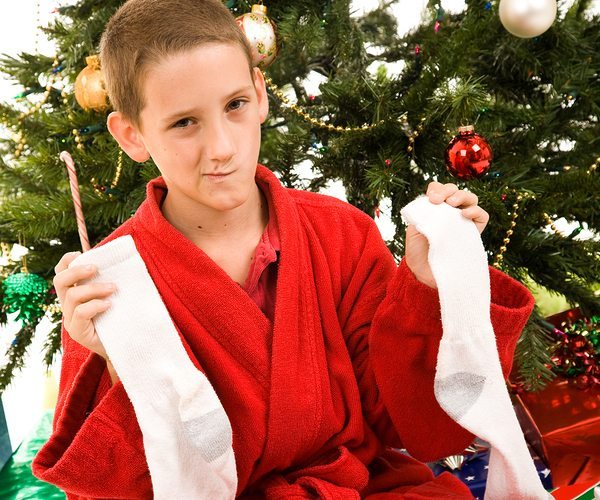Remember how we talked last week about weird relatives? Bad news – your kids are weird around the holidays, too. Mostly because they just cannot calm the flip down but also because they get a little greedy this time of year. In fact, the title of this article is a direct quote from a child at a Christmas party. The entitlement isn’t too surprising, since everyone from their cousins to their coaches are handing them treats and gifts all month. So, how do you make sure your kiddos continue to show gratitude even as the gift tally mounts? Here are some tips!
To Give Is Better Than To Receive
Prime your children for situations where there may or may not be gifts. Explain that you don’t know whether their best friend/piano teacher/Great Uncle Charlie will have a present for them but that WE DO NOT, UNDER ANY CIRCUMSTANCES, ASK FOR ONE (Pro tip: It’s so, so much better to have this conversation before versus during the get-together!).
Discuss how the other person would feel if your child asked for a gift but there was no gift and remind her that the gift belongs to the other person until the very moment it’s given. Note that even if your child is giving the other person a gift, there is no guarantee he will get one in return. Encourage your child to focus, instead, on the person receiving the gift. Get excited together imagining how much fun the other person will have (or, hopefully, at least pretend to have) while opening it.
Beyond Thank You
When the tables are turned and your child is on the receiving end of a gift, prepare yourself with these important reminders for how to accept a gift:
- Avoid saying, “I already have this!” or offering the gift to another person in the room. You’d be surprised how frequently kids try to give away their gift when it’s something they don’t want or already have. Awk-ward!
- Smile – even if it’s fake – and say something positive about the present – even if you hate it. Work with your child on comments he could make about the gift that are honest but neutral to positive. For example, if he is given a pack of blue socks, he might say, “I love the color blue!” if he does, in fact, love the color blue. Explain that saying so is not lying even if he really hates the blue socks (or the fact that he got socks for Christmas). For a fun story about being honest without telling everything you know, check out the book Being Frank by Donna Earnhardt and Andrea Castellani.
- Keep negative thoughts to yourself. It’s O.K. to share these with mom or dad later but never in front of the giver. Remind your child that being negative about gifts hurts the other person’s feelings and also makes him/her less likely to give a gift in the future.
- Some kind of comment and a “Thank you!” are required. She doesn’t have to go on-and-on, but ignoring that she’s been given a present is unacceptable.
- In cases where your child is extremely disappointed with the gift, it may be tough for him to control his emotions. Talk ahead of time about ways to calm down in that situation. Take deep breaths, fake a smile (this really does help us feel a little better), and alternately squeeze and relax his fists. If worse comes to worst, he should excuse himself to the bathroom for a few minutes – feel free to join him if he’s open to that – and come back when he’s calm to say, “Thank you.”
If you suspect your child won’t be able to fake-it-until-she-makes-it with gifts, arrange to have her open them away from the giver so that her reactions won’t be hurtful. Happy gifting!
Articles You May Also Enjoy
- Setting Healthy Boundaries with Wacky, Tacky Christmas Relatives
- 7 Steps to Surviving Christmas with Kids
- Tis the Season to Teach Giving
Kristen Berthiaume is a clinical psychologist whose other day job is as mom to three willing product testers. Find her articles on all things child-wrangling at “Parenting with a Ph.D.” over on birminghammommy.com.


 7 Steps for Choosing the Right Pet for Your Family
7 Steps for Choosing the Right Pet for Your Family 5 Kid-Friendly Soups for Winter
5 Kid-Friendly Soups for Winter The Presents of Christmas Past
The Presents of Christmas Past All I Want for Christmas is… Some Peace and Quiet
All I Want for Christmas is… Some Peace and Quiet 10 Christmas Cookies Kids Can Help Make
10 Christmas Cookies Kids Can Help Make